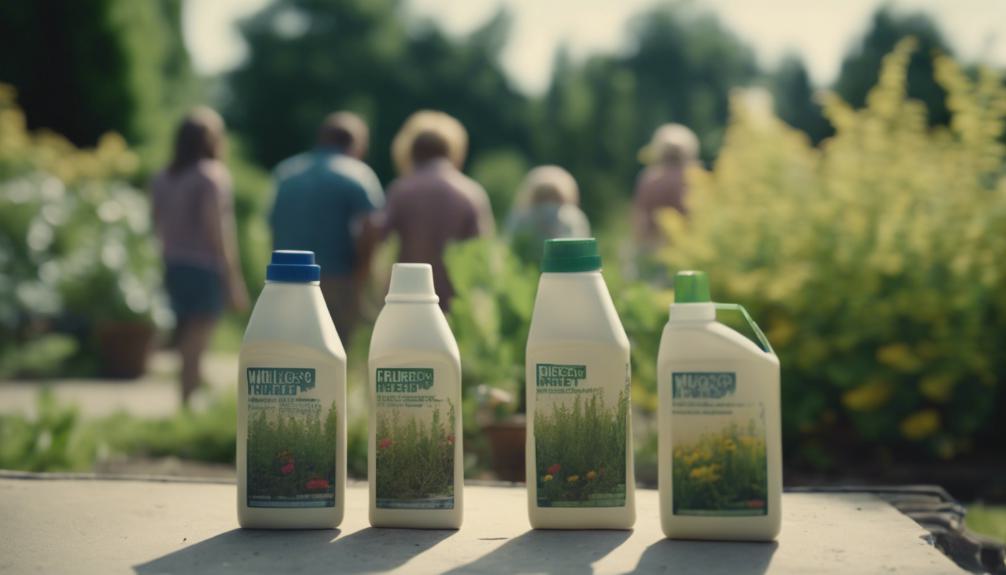Weed Killer Lawsuit
Have we ever truly considered the impact of the chemicals we use in our daily lives, specifically those in weed killers like Roundup? We're exploring the controversy surrounding its alleged health risks, including cancer allegations and the ongoing legal battles that have caught the nation's attention. Victims' stories and the science behind these claims add depth to our understanding, while the defense's argument presents another side to the story. As we navigate through the current lawsuit status and the future of weed control, one can't help but ponder the broader public health implications. What might this mean for our approach to everyday chemicals?

The Roundup Controversy

At the heart of the Roundup controversy lies widespread concern over its alleged health risks, particularly its potential link to cancer. We've seen an increasing number of studies and reports challenging the safety of this widely used herbicide, igniting debates among scientists, regulatory bodies, and the public. The active ingredient in Roundup, glyphosate, has been at the center of this storm. Some research suggests that prolonged exposure to glyphosate can increase the risk of certain types of cancer, sparking fear and anger among consumers and workers who've used the product for years, believing it to be safe.
We're witnessing a growing distrust towards the regulatory bodies that once declared Roundup safe for use. The controversy has escalated as more individuals come forward, claiming their health has been compromised after exposure to the herbicide. This has led to a broader conversation about the transparency and reliability of the studies used to approve products like Roundup and whether enough is being done to protect public health. As we navigate through this complex issue, it's clear that the Roundup controversy is not just about a single product but reflects wider concerns over agricultural practices and public safety.
Legal Actions Nationwide

Across the United States, we're seeing a surge in legal actions against the makers of Roundup, as individuals and groups allege harm from its use.
As we delve deeper, it's evident that these lawsuits span from coast to coast, encompassing a wide range of plaintiffs. It's not just farmers or agricultural workers stepping forward; homeowners, gardeners, and even landscapers are joining the fray, claiming that Roundup's widespread use has adversely affected their health or property. What's striking is the diversity of legal claims being made, indicating this issue cuts across various aspects of daily life and work.
We're also witnessing a significant mobilization of legal resources. Law firms across the country are rallying to represent those affected, offering free consultations and working on contingency, meaning they don't get paid unless they win. This approach has opened the doors for many who might have otherwise hesitated to take legal action due to the cost.
Moreover, the collective push for accountability and transparency from Roundup's manufacturer is gaining momentum. Through these lawsuits, we're not just seeking compensation for alleged harm; we're demanding stricter regulatory oversight and clearer labeling to prevent future incidents. This legal battle is shaping up to be not just about recompense, but about catalyzing change in how hazardous substances are managed and disclosed.
Cancer Allegations Explored

Turning our focus to another critical aspect, we're now exploring the serious allegations that Roundup may be linked to cancer. The crux of the matter lies in the active ingredient, glyphosate, which has been at the center of heated debates and scientific scrutiny. Several studies have hinted at a potential link between glyphosate exposure and an increased risk of developing certain types of cancer, most notably non-Hodgkin lymphoma.
We're aware that these findings have not only sparked fear among consumers but also led to a wave of litigation against Monsanto, the company behind Roundup. It's crucial to understand that the International Agency for Research on Cancer (IARC), a part of the World Health Organization (WHO), classified glyphosate as "probably carcinogenic to humans" back in 2015. This classification has fueled the ongoing legal battles and public outcry.
However, it's important to note that other regulatory bodies have come to different conclusions regarding glyphosate's safety. For instance, the U.S. Environmental Protection Agency (EPA) has maintained that glyphosate is unlikely to pose a cancer risk to humans. This discrepancy in findings adds another layer of complexity to the discussion, leaving many to wonder about the true nature of the risks associated with Roundup.
Victims' Stories

We've heard numerous heart-wrenching stories from individuals who believe their health has been severely impacted by Roundup exposure. Families have shared tales of loved ones who spent years applying the weed killer, unaware of the potential risks, only to be diagnosed with life-altering illnesses. The consistency in these narratives is striking – hardworking people, often in agricultural settings, who trusted a product that was a staple in their daily routines, now facing dire health consequences.
Many victims speak of the confusion and betrayal they felt upon learning about the possible link between Roundup and their illnesses. It wasn't just about battling a disease; it was about confronting an industry giant whose product they believed was safe. The emotional toll, they say, is almost as debilitating as the physical one. They're not only fighting for their health but also for accountability and justice.
Hearing these stories, we can't help but feel a deep sense of empathy and a strong drive to support these individuals in their legal battles. It's clear that behind every lawsuit, there's a personal story of struggle, resilience, and a desperate search for answers. These are the stories that fuel our commitment to seeking justice for victims of Roundup exposure.
Science Behind the Claims

As we turn our attention to the science behind the claims, it's clear that understanding the impact of Roundup involves examining the findings from glyphosate toxicity studies. We'll also look at an overview of the health effects linked to its use and how these form the basis of legal actions. This exploration is crucial for grasping the full scope of the lawsuit's foundation.
Glyphosate Toxicity Studies
Our examination of glyphosate toxicity studies reveals a complex and contentious debate over the herbicide's safety and environmental impact. Researchers across the globe have delved into glyphosate's effects, producing studies that span a broad spectrum of outcomes. Some scientific investigations suggest that when used according to guidelines, glyphosate poses minimal risk to human health and the environment. Yet, we've also encountered compelling research indicating potential adverse effects on ecosystems and non-target species, including beneficial insects and soil microbiota. These studies highlight the intricate balance between achieving agricultural efficiency and preserving environmental integrity. As we navigate through the sea of data, it's clear that the discourse surrounding glyphosate's safety is far from settled, underscoring the need for ongoing, rigorous scientific inquiry.
Health Effects Overview
Turning our focus to the health effects of glyphosate, it's crucial to unpack the science behind the claims made in numerous lawsuits. Research has shown that prolonged exposure to glyphosate, the active ingredient in many weed killers, can lead to significant health issues. Studies have linked it to a variety of conditions, including but not limited to, non-Hodgkin lymphoma and other cancers. We're also learning about its potential to disrupt endocrine systems, which can lead to a cascade of health problems. It's important for us to understand the mechanisms by which glyphosate can harm human health. By delving into the scientific findings, we're better equipped to grasp the full scope of its impact. This knowledge is crucial for both affected individuals and the broader public.
Legal Evidence Basis
We'll now explore the scientific evidence that forms the bedrock of legal claims against glyphosate-based weed killers. Studies have linked glyphosate, the active ingredient in these herbicides, to various health issues, including cancer, specifically non-Hodgkin lymphoma. This connection is crucial because it provides a tangible basis for lawsuits. Researchers have delved into how glyphosate can disrupt human cells, potentially leading to DNA damage and cancerous growths. The International Agency for Research on Cancer (IARC), a part of the World Health Organization, has classified glyphosate as "probably carcinogenic to humans," lending significant weight to these legal battles. This classification, backed by scientific investigations, plays a pivotal role in supporting the claims of individuals who've developed health issues after exposure to glyphosate-based products.
The Defense's Argument

The defense argues that extensive scientific studies have consistently proven the safety of their weed killer product. We've gathered a comprehensive body of research, conducted by reputable scientists around the globe, that supports our stance. It's crucial to understand that our product has undergone rigorous testing processes, approved by leading regulatory bodies. These tests are designed to ensure that when used as directed, our weed killer poses no harm to humans, animals, or the environment.
We're aware of the concerns raised but want to emphasize the importance of science-based evidence in this debate. The allegations against our product largely rely on a selective interpretation of data, which doesn't reflect the consensus in the scientific community. We've also implemented transparent labeling and instructions to ensure our customers are well-informed on the proper use of the product.
Furthermore, it's worth noting that agriculture and gardening practices have significantly benefited from the use of our weed killer. It's been instrumental in improving crop yields and managing weeds efficiently, which is why it's trusted by farmers and gardeners alike. We remain committed to providing safe and effective solutions, guided by the latest scientific findings and regulatory standards.
Current Lawsuit Status

We're now turning our attention to the current status of the Roundup lawsuit. It's essential to keep updated on the latest legal proceedings, review the settlement offers on the table, and consider the outlook for future litigation. Let's take a closer look at where things stand today.
Legal Proceedings Update
As of our latest update, we've learned that the Roundup lawsuit is currently in the discovery phase, with both sides preparing for upcoming trials. This critical stage involves the collection and exchange of evidence between the plaintiffs and the defendant, Monsanto. It's a meticulous process, where both parties comb through documents, depose witnesses, and gather expert testimony to bolster their respective cases. We're closely monitoring the developments, as the outcome of the discovery phase can significantly influence the direction of the lawsuit. The legal teams are working tirelessly, scrutinizing every detail to ensure they're ready for trial. It's a pivotal time in the lawsuit, and we're committed to keeping you informed every step of the way.
Settlement Offers Reviewed
In the latest development, we've started reviewing settlement offers from Monsanto, marking a critical juncture in the ongoing Roundup lawsuit. This phase is pivotal as it directly impacts those affected by the alleged harmful effects of Roundup weed killer. We're carefully assessing the terms proposed by Monsanto to ensure they adequately compensate our clients for their suffering and losses. It's essential that these offers reflect the severity of the claims and the evidence we've presented throughout this legal battle. We're committed to transparency throughout this process and are in constant communication with our clients, providing updates and guidance based on our evaluations. Rest assured, our goal remains to secure a fair and just resolution for all involved, holding Monsanto accountable for their actions.
Future Litigation Outlook
The future of this litigation holds both uncertainty and promise as we continue to navigate the complexities of the case against Monsanto. We're aware that the landscape of legal battles is ever-changing, and this case is no exception. Recent rulings and ongoing negotiations hint at a shifting momentum, yet nothing is set in stone. We're committed to staying on top of every development, ensuring we're prepared for any outcome. Our team is optimistic about the potential for holding Monsanto accountable and securing justice for those affected. However, we also recognize the challenges ahead and are bracing for a long fight. Rest assured, we'll keep pushing forward, adapting our strategies as necessary, and keeping our clients informed every step of the way.
Future of Weed Control

We're witnessing a pivotal moment in how we tackle weed control, with innovative methods on the horizon. As we move forward, we're seeing a shift towards environmentally friendly and sustainable practices that don't just focus on eliminating weeds but also on preserving the ecosystem. We're exploring biological control methods, using natural predators and competitors to manage weed populations without the heavy reliance on chemical herbicides.
We're also delving into precision agriculture, utilizing technology to apply treatments only where needed, significantly reducing the overall use of chemicals. This approach not only targets weeds more effectively but also minimizes the impact on surrounding flora and fauna.
Furthermore, we're investing in research to develop new herbicides that are less harmful to the environment and non-target species. The goal is to find solutions that are both effective against weeds and safe for everything else.
As we continue to innovate, it's clear that the future of weed control is leaning towards methods that are sustainable and environmentally conscious. We're committed to finding a balance between effective weed management and the preservation of our planet. This is a journey we're all on together, and every step forward is a step towards a healthier, more sustainable world.
Public Health Implications

As we explore sustainable weed control methods, it's crucial to consider their implications on public health. The widespread use of chemical herbicides, especially those like Roundup, has raised significant concerns. Studies have linked these chemicals to a variety of health issues, from skin irritations to more severe conditions like cancer. It's imperative that we understand these risks to protect our communities.
Moreover, the environmental impact of these chemicals can't be ignored. They don't just stay on the plants they're applied to; they seep into the soil and water, potentially affecting wildlife and even our drinking water. This indirect exposure could contribute to long-term health problems for a broader population than initially assumed.
We're at a pivotal point where we need to balance effective weed control with the safety of our environment and ourselves. The push for more natural and less harmful alternatives is growing stronger. As we move forward, it's our responsibility to advocate for and adopt practices that ensure not only the health of our crops but also that of our planet and its inhabitants. Let's be proactive in seeking solutions that safeguard our health and ecosystems for generations to come.
Frequently Asked Questions
What Are the Initial Steps to Take if I Think Roundup Has Affected My Health?**
If we think Roundup has affected our health, we'd first see a doctor for a diagnosis. Then, we'd gather any evidence of exposure and contact a lawyer experienced in such cases to discuss our options.
How Can Someone Outside of the U.S. Participate in a Lawsuit Against Roundup if They Believe They've Been Harmed?**
We're wondering how someone outside the U.S. can join a lawsuit against Roundup if they've been harmed. It's not straightforward, but finding a lawyer experienced in international cases might be the first step.
What Types of Compensation Can Plaintiffs Expect to Receive if Their Lawsuit Against Roundup Is Successful?**
We're curious about the types of compensation we could expect if our lawsuit against Roundup is successful. Medical costs, lost wages, and pain and suffering are likely areas where we might receive financial restitution.
Are There Any Alternative Weed Control Products That Are Considered Safer Than Roundup, According to Recent Studies?**
We've learned that recent studies do suggest there are safer alternatives to Roundup for weed control, including natural and organic options that don't carry the same health risks associated with chemical herbicides.
How Does the Litigation Process for a Roundup Lawsuit Differ From Other Personal Injury Lawsuits?**
We're curious about how the litigation process for a Roundup lawsuit might differ from other personal injury lawsuits. It seems like there could be unique steps or challenges involved in these specific cases.

This post has been generated by AI and was not reviewed by editors. This is Not legal advice. Please consult with an attorney.




